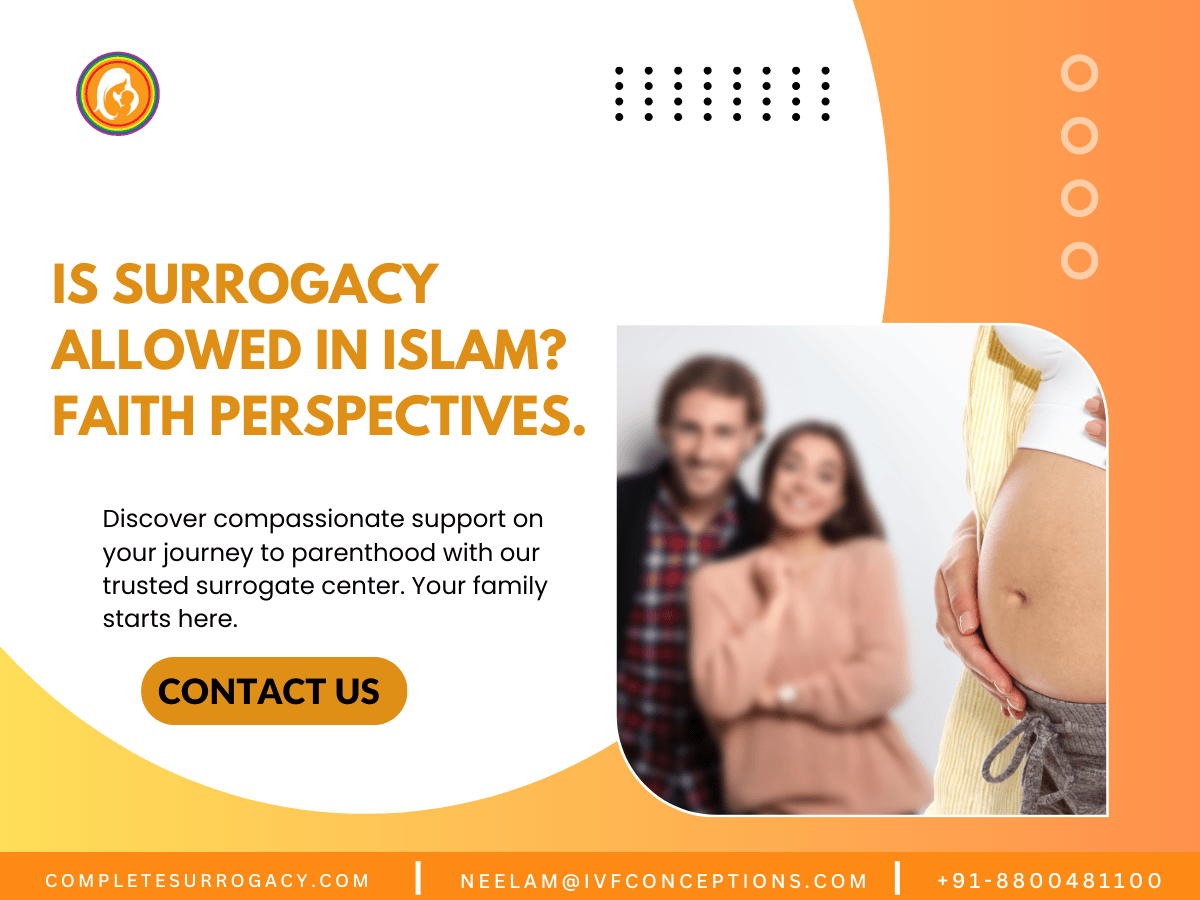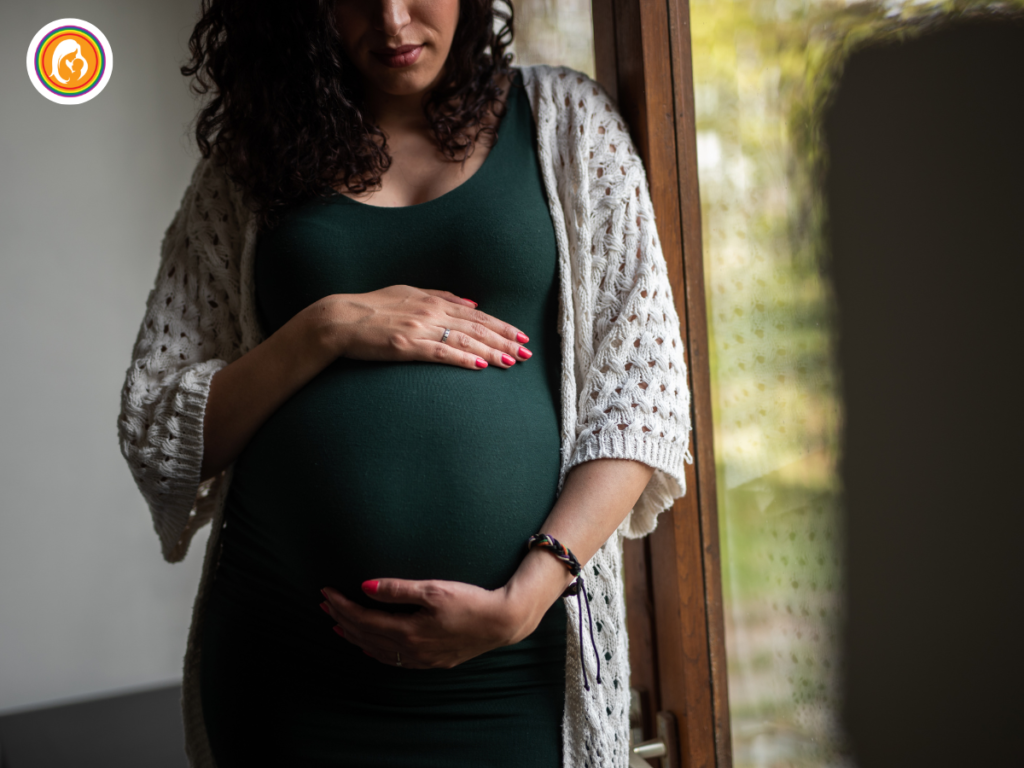Is Surrogacy Allowed in Islam? Faith Perspectives.

The question Is Surrogacy Allowed in Islam has sparked significant debate, involving Islamic teachings on family and lineage. The views on this topic vary widely among scholars, and the complexity lies in balancing religious values with modern reproductive practices. Islamic perspectives on surrogacy are shaped by cultural beliefs, legal considerations, and ethical concerns, all of which impact how the practice is interpreted within different Muslim communities.
Some scholars believe that surrogacy goes against the core principles of Islamic family law due to concerns about lineage and the sanctity of marriage, while others argue that it may be permissible under certain circumstances, such as when the surrogate is a close family member or when it involves the use of the intended parents’ own genetic material.
- Book an online appointment: Get a free online consultation.
- Call\W:+91-8800481100 Email:neelam@ivfconceptions.com
Navigating the question of surrogacy and Islamic law requires a deep understanding of religious texts and modern interpretations, making it important for Muslim intended parents to consult with knowledgeable religious scholars to determine the best course of action based on their specific beliefs and circumstances.
In a world where over 90% of Muslim countries ban surrogacy, the topic is very controversial. But Iran is an exception, allowing surrogacy under strict rules. The Islamic Council of Fixes of Mecca once allowed surrogacy, but later banned it due to issues with knowing who the parents are.
This shows that not all reproductive help is banned in Islam. It encourages us to look deeper into the Islamic view on surrogacy.
Key Takeaways
- 90% of Muslim countries prohibit surrogacy, equating it to the prohibition of sperm and eggs donation.
- Iran allows surrogacy under specific legal conditions, making it a unique case among Muslim nations.
- Islamic law emphasizes high fertility rates and promotes infertility treatments within stringent conditions.
- Surrogacy is considered analogous to adultery by many Sunni scholars, presenting a significant barrier to its acceptance.
- There are ongoing debates among Islamic scholars, reflecting differing interpretations of the permissibility of surrogacy.
More Resources to Read:
Infertility Treatment and Surrogacy Process
9 Factors To Improve IVF Pregnancy Rate
International Surrogacy Options Worldwide
Surrogacy Guide for Surrogate Mothers
Understanding Surrogacy: Definitions and Types
Surrogacy is a complex option for those facing infertility. It lets a woman carry and deliver a child for someone else. This helps with the emotional and physical challenges of not being able to conceive naturally. It’s important to know what surrogacy is and the different types.
What is Surrogacy?
Surrogacy means a woman gets pregnant and gives birth to a child for someone else. It’s for couples who can’t have kids due to medical issues or other reasons. There are two main types: genetic and gestational surrogacy. Each type has its own journey and considerations for families.

Different Types of Surrogacy
Exploring surrogacy in Islam, it’s key to know about genetic and gestational surrogacy:
| Type of Surrogacy | Description | Relationship to the Child |
| Genetic Surrogacy | The surrogate’s egg is fertilized by the commissioning father’s sperm, creating a genetic link between the surrogate and the child. | Surrogate mother is biologically related to the child. |
| Gestational Surrogacy | The embryo, created from the eggs and sperm of the commissioning couple, is implanted into the surrogate’s uterus, with no genetic linkage. | Surrogate mother has no biological relationship to the child. |
These types are key in legal and ethical talks about surrogacy. Each type has its own challenges and societal impacts, especially in Islamic views. Knowing these types helps understand the debates on surrogacy’s ethics and legality.
Historical Context of Surrogacy in Islamic Law
Surrogacy has been a topic of debate in Islamic law since the 1980s. Scholars have discussed if and when it might be allowed. Early talks suggested it could be okay under certain conditions.
However, opinions have shifted over time. Now, most scholars believe surrogacy is not allowed. They see it as a form of illegal sex. They use the Quran and old teachings to back up their views.
Surrogacy brings up big questions in Islamic thought. Many Muslim doctors think it’s wrong. They point to the Quran, like Chapter 58, Verse 2, to explain why.
What makes someone a mother is a key issue in surrogacy debates. Scholars dive deep into Islamic law to figure it out. They see surrogacy as similar to adultery and worry about who the real mother is.
But some think Islamic law might allow surrogacy. They say it could help couples have children. They point to the Quran and the idea of doing good for society. Yet, most believe we should accept changes in family life as God’s will.
Islamic Perspective on Infertility and Treatment
Islam values family and reproduction highly, seeing children as great blessings. It understands the emotional and spiritual value of having kids. This creates a deep understanding of the challenges couples face with infertility.
Islam encourages couples to seek treatment of infertility in Islam. However, it sets clear rules for medical help.

Encouraging Reproduction in Islam
Reproduction is highly valued in Islamic teachings. The Qur’an talks about the blessings children bring to families. This promotes a culture that values family growth.
Infertility affects about 8 to 12 percent of couples worldwide. It can cause shock and grief. The need for effective solutions is clear, especially in communities where social pressures are high.
With many Muslims facing infertility, it’s crucial to consider ethical and religious aspects when looking for treatments.
Islamic Laws Regarding Third-Party Intervention
The islamic view on infertility focuses on third-party intervention in Islam. Traditional teachings say using sperm or egg donors not part of the couple’s marriage is forbidden. This rule also applies to creating embryos with genetic material from outside the marriage.
Assisted reproductive technology must follow Islamic guidelines. This ensures ethical integrity and respect for marriage.
| Infertility Statistics | Data |
| Natural Cycle Fecundity | 20–25% for a healthy couple |
| Infertile Couples | 10–15% experience infertility |
| ART Births Annually | 219,000 to 246,000 babies |
| IVF Success Rate | 20 to 30% resulting in live birth |
| Major Congenital Malformations | Increased risk associated with ART |
| Infertility Worldwide | Affects around 80 million people |
| Middle Eastern Infertility Rates | 10 to 15% of married couples |
| Psychosocial Impact | Stigmatizations and social exclusion are common |
Discussing the Concept of Lineage in Islam
The idea of lineage in Islam is very important. It shapes family structures and identity. Islamic teachings stress the need for children to know their biological parents.
This view influences society and traditions. It helps us understand our heritage and family ties.
In Islam, lineage affects family rights and duties. Clear parental relationships are key to strong family bonds. This is why surrogacy raises concerns about lineage.
Surrogacy might make a child’s lineage unclear. This could change how we see maternal identity.
Islamic scholars say lineage is crucial for family unity. Knowing one’s parents is essential for emotional support. It guides us in life.
The Islamic concept of nasl (lineage) is important in families and communities. It values genealogical ties across generations.
Surrogacy makes family structure in Islam more complex. Scholars believe knowing one’s lineage is vital for identity. Islamic law supports this, seeing hereditary background as important for personal and communal life.
In summary, lineage in Islam is key in many discussions. It affects reproductive practices and family dynamics. Understanding lineage helps us build strong family and community ties.
Islamic Scholars’ Views on Surrogacy Practices
Most Muslim scholars say no to both traditional and gestational surrogacy. They worry about legal and emotional issues between the surrogate and the biological parents. Yet, some schools now think gestational surrogacy might be okay for infertile couples, with caution.
Grasping these views means looking at Islamic law and scripture. The Islamic Fiqh Council and Shīʿī scholars offer insights into different Islamic views on surrogacy.
| Aspect | Traditional Surrogacy | Gestational Surrogacy |
| Genetic Link | Surrogate provides egg; blood connection with the child. | Child genetically linked to commissioning couple. |
| Maternal Identity | Complicated; surrogate is mother in legal terms. | Clearer maternal identity; commissioning couple retains rights. |
| Islamic Views | Generally viewed as impermissible. | Some scholars allow under certain conditions. |
| Ethical Concerns | High possibility of legal and emotional disputes. | Potential for ethical issues but seen as a solution for infertility. |
Surrogacy Rulings in Islamic Jurisprudence
Islamic scholars have different views on surrogacy. Most modern scholars say it’s wrong and against Islamic law. They see it as similar to adultery, raising big ethical and legal issues.
The Islamic Fiqh Academy at Jeddah is key in discussing surrogacy’s legality. They look closely at its effects. They argue against surrogacy, pointing to the Quran and Hadith. These texts say only biological mothers can be called mothers.
But, there are different opinions on this topic. Sunni scholars mostly say no to surrogacy because of adultery concerns. Shiite scholars, however, might be more open to it for married couples facing infertility.
Infertility is a big problem in Islamic families, causing a lot of shame. About ten million Muslims worldwide face this issue. It’s often seen as a financial burden on families.
Statistics show that infertility can be caused by male factors in about 50% of cases. This puts a lot of stress on women emotionally and socially.
Even though some places like Iran and Lebanon have laws supporting surrogacy, opinions are still divided. The debate is based on the Quran, Hadith, Ijma, and qiyas. These texts guide scholars in understanding surrogacy.
Surrogacy Laws in Islamic Countries
Surrogacy laws in Islamic countries vary a lot. This is because different interpretations of Sharia law exist. Iran is a special case, where surrogacy is seen in a unique light within Shia Islam. This shows a different approach compared to many other Muslim-majority countries.

Case Study: Surrogacy in Iran
In 1999, Iran’s Ayatollah Khamane’i said surrogacy is okay under certain conditions. This is different from many Sunni places. Shia scholars like Ayatollah Sistani and Ayatollah Makarem Shirazi agree, but with rules like honesty and transparency.
This openness towards assisted reproductive technologies shows how culture affects surrogacy laws in Islamic countries.
Comparative Analysis with Other Muslim Countries
On the other hand, Saudi Arabia and Pakistan are very strict about surrogacy. Sunni scholars often argue about its ethics, leading to no clear agreement. This shows how complex Islamic law is, especially when it comes to reproduction.
Important values like the sanctity of marriage and the importance of lineage guide these debates. This leads to a cautious view on international surrogacy practices.
| Country | Surrogacy Status | Religious Interpretation | Key Scholars’ Views |
| Iran | Permitted under conditions | Shia | Ayatollah Khamane’i, Ayatollah Sistani |
| Saudi Arabia | Strictly prohibited | Sunni | Divided opinions among scholars |
| Pakistan | Strictly prohibited | Sunni | Divided opinions among scholars |
| Turkey | Prohibited | Sunni | General prohibition |
More Resources to Read:
Surrogacy Guide for Surrogate Mothers
Surrogacy Guide for Intended Parents
How does the surrogacy process work
Conclusion
Surrogacy in Islam is a complex topic. It involves tradition, morality, and new reproductive options. Most Muslims believe surrogacy is not allowed because of concerns about lineage and motherhood.
However, with more people using surrogacy, there are different views among scholars and users. This shows the ongoing debate in Islam about surrogacy.
To understand surrogacy in Islam, we need to look at both the technology and the ethics. Some Islamic scholars say surrogacy is okay under certain conditions. But many see it as a change that challenges the traditional family.
It’s important for scholars and users to keep talking about surrogacy. As new technologies and views develop, we need to understand and discuss them. This will help us navigate the changing world of surrogacy.
If you’d like to learn more about IVF, Egg Donation, or surrogacy services globally, check out the rest of our website at Complete Surrogacy Agency. We offer legally secure and affordable surrogacy consulting services for FREE.
Complete Surrogacy: Your Trusted Partner in International Surrogacy
At Complete Surrogacy, we have over 15 years of experience in international surrogacy, guiding 4,000+ intended parents worldwide. We provide safe, ethical, and affordable surrogacy solutions for single parents, LGBTQ+ couples, and heterosexual couples.
As members of EFS and ESHRE, we adhere to the highest ethical and professional standards. Our expert team is committed to providing accurate, compassionate, and transparent guidance, ensuring a legally secure and smooth journey to parenthood.
Let us help you build your family with trust, care, and integrity.
Get in touch for one FREE Surrogacy Consultancy!

FAQs for surrogacy in Islam
Is surrogacy allowed in Islam?
Most Islamic scholars believe surrogacy is not allowed. They worry about lineage and who the mother is.
What is the Islamic perspective on surrogacy?
Islam sees surrogacy as a big ethical issue. It can confuse who the child’s parents are and upset family structures. So, most think it’s not okay.
What are the different types of surrogacy?
There are two main types. Traditional surrogacy uses the surrogate’s egg. Gestational surrogacy uses the couple’s genetic material.
How have surrogacy regulations evolved in Islamic law?
At first, some thought surrogacy might be okay under certain conditions. But now, most Islamic scholars say it’s not allowed.
What does Islam say about addressing infertility?
Islam says treating infertility medically is okay. But, it must be done within marriage. No third-party involvement is allowed.
Why is lineage important in Islam?
Lineage is key in Islam. It helps establish clear family ties. It ensures children know their biological parents and keeps families together.
How do traditional and gestational surrogacy differ in Islamic views?
Traditional surrogacy is seen as more complex because of issues with maternal identity. Some scholars might accept gestational surrogacy under certain conditions. But, it’s still mostly banned.
What are the Islamic rulings regarding surrogacy practices?
Islamic law mostly bans surrogacy. It worries about lineage and what it means to be a mother.
How do surrogacy laws differ in Islamic countries?
Laws on surrogacy vary in Islamic countries. Iran allows it under certain conditions. But, countries like Saudi Arabia and Pakistan have stricter rules.
What are the implications of surrogacy in an Islamic context?
Surrogacy in Islam mixes old values with new reproductive challenges. It leads to debates among scholars and families trying to figure it out.
Source Links
- https://vittoriavita.com/ivf-and-surrogacy-in-the-islamic-religion/ – Is surrogacy allowed in islamic religion? | VittoriaVita
- https://360info.org/why-islam-has-two-ways-of-looking-at-surrogacy/ – Why Islam has two ways of looking at surrogacy – 360
- https://papers.ssrn.com/sol3/papers.cfm?abstract_id=3952492 – Permissibility of Surrogacy in Islamic Law
- https://www.ncbi.nlm.nih.gov/pmc/articles/PMC3708631/ – Ethics of Surrogacy: A Comparative Study of Western Secular and Islamic Bioethics

Author Bio: Neelam Chhagani is an International Surrogacy Expert with 15 years of experience in the fertility and surrogacy domain. As the founder of IVF Conceptions and Complete Surrogacy, she has guided over 4,000 intended parents worldwide on their surrogacy journey to parenthood. Recognized as a trusted authority, she specializes in holistic infertility solutions and third-party reproduction consulting.
Holding an MA in Counselling Psychology and a PGD in Mental Health, Neelam is a proud member of the European Fertility Society (EFS) and the European Society of Human Reproduction and Embryology (ESHRE). She is also a leading surrogacy blogger, providing valuable insights into ethical and practical surrogacy solutions.
Since 2010, committed to supporting ALL family types, Neelam has been passionate about helping intended parents grow their families with compassion, integrity, and a focus on secure and affordable surrogacy options Globally.
Learn more about Neelam:
https://www.ivfconceptions.com/neelam-chhagani-surrogacy-consultant/
https://www.linkedin.com/in/neelam-chhagani-92892229/















I was introduced to Neelam by a friend who worked with Neelam for surrogacy. Neelam is absolutely wonderful. I am a single male and the journey to fatherhood is not that easy. Neelam connected me to a program ideal for my circumstances. She was with me throughout the pregnancy providing advice and guidance along the way. I am so grateful I found her and am thrilled today that I have a beautiful daughter. I highly recommend Neelam to anyone who is on a journey to become a parent. Having a child has changed my world for the better. I wish others success with their own journey and recommend you connect with Neelam to find a path that is best for you.
SA (USA)